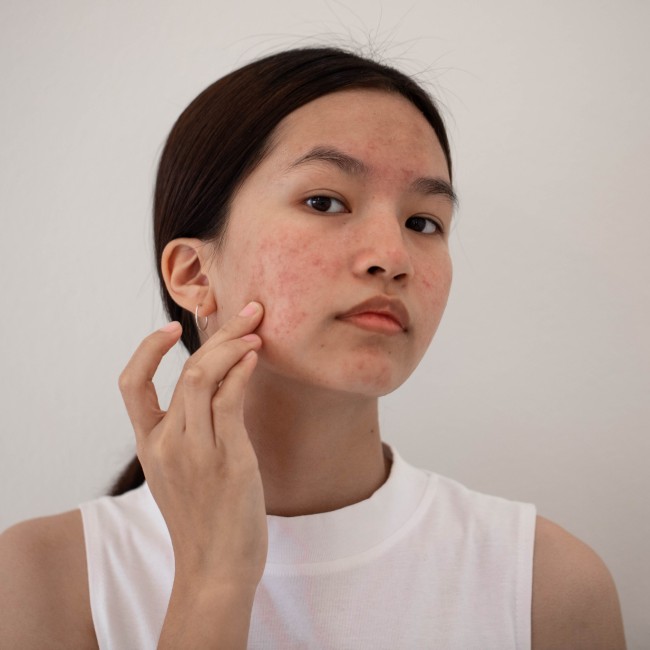
Exactly Acne
Acne is defined as a common skin condition that occurs when hair follicles become clogged with dead skin or sebum. Sebum is a term used to describe the natural oil produced by the skin that helps to prevent the skin from drying out. There are many different types, causes, triggers and treatments for acne.
The most important part of the struggle with recurring acne is education and execution. Acne can have a great mental toll on those who suffer from the condition. Acne can affect your mental health in ways that only other acne prone individuals can relate. With proper education, as well as following a set skin care routine that is specific to your concerns, acne can be greatly improved.
Non-Inflamed vs. Inflamed (Cystic) Acne
- Non-Inflamed Acne can be characterized by open and closed comedones– white heads and black heads. These typically do not cause swelling.
- Inflamed Acne/ Cystic Acne is associated with inflammatory acne that is deep withing the skin. Often characterized by papuales (red-ish hued ), pustules (pus filled), and nodules/cysts (large, firm and painful bumps that form mostly under the surface of the skin).
Conditions that may resemble acneinclude Pustular Rosacea and Fungal Folliclitis.
- Pustular Roseasea is a form of rosacea that may closely resemble acne. The charatrists or pustular rosacea can include pus filled blemishes and red swollen bumps. The bumps can appear on the cheeks, chin, and forehead and are frequently misidentified as acne. Treatments for pustular roseasea typically include zelaic acid, benzoyl peroxide, and sulfur.
- Fungal Folicilitis is a condition charactered by clusters of small, itchy red bumps on the skin. This type of condition occurs when the hair follicles contract a “yeast infection”. Treatment for fungal foliculitis include l-mandelic acid, sulfur, 1% or 2% ketoconazole or zinc pyrithione (found in dandruff shampoos).
Hormonal Factors with Acne
Hormonal acne refers to breakouts that occur due to certain hormone fluctuations. Certain birth controls, puberty, menopause, pregnancy, Polycystic Ovary Syndrome (PCOS) , and other causes for elevated androgen hormones can be a driving factor in development of acne due to hormonal changes.
Acne Factors
There are 4 main factors that cause acne. These factors are all heavily influenced by genetics, hormones, diet, medications, environment, and other lifestyle and health factors.
- Excess Sebum Production - This factor is heavily influenced by hormonal factors and dehydrated skin. Dehydrated skin tends to overproduce oil to compensate for lack of moisture.
- Abnormal Shedding of Dead Skin Cells - While abnormal shedding is mainly a genetic component, it may be influenced by other factors as well. Acne prone skin can shed dead skin cells up to 5 times faster than skin is able to turn over. This can cause a build up of dead skin cells within the pores– leading to acne. Environmental damage to the follicles, such as UV damage can also interfere with the skins ability to properly shed.
- Bacteria - Intrinsic, or internal factors, also play a big role in certain bacteria producing acne. The microbiome of the gut and skin have been heavily linked with acne. An imbalance in certain strains of bacteria on the skin can interfere with the ability to tolerate certain materials that the skin commonly comes into contact with. Excessive pathogenic bacteria, or bacteria that can cause disease, can lead to clogs becoming infected and inflamed.
- Inflammation - Inflammation ismainly influenced by bacteria, stress, and other health conditions. Inflammation is also the main driving factor in the development of acne scarring.
Treatment
Acne can be treated with targeted at home skin care regimens, as well as professional in office treatments with a trained esthetician. The most effective treatment plans tend to involve a multitude of approaches: proper and personalized skin care at home (sometimes prescription strength), adjustments to diet & lifestyle factors, monthly facials,chemical peels, and Morpheus8.
Non-inflamed acne treatment protocol can typically include products which contain salicylic acid, retinol/tretinoin, AHAs, and enzymes.
Inflamed/cystic acne may involve more aggressive treatment. This treatment protocol may include products with benzoyl peroxide, salicylic acid, and l-mandelic acid.
If you are struggling with acne, please remember to be kind to yourself. The simple fact that you have read this blog mean that you are on the right path to improvement. It is important to remember that you NOT alone. The mental toll that acne can have on individuals can lower self esteem and self- worth. Take necessary time for yourself– to improve you physical and mental well being. Your acne improvement journey can start today, or whenever you are ready.



